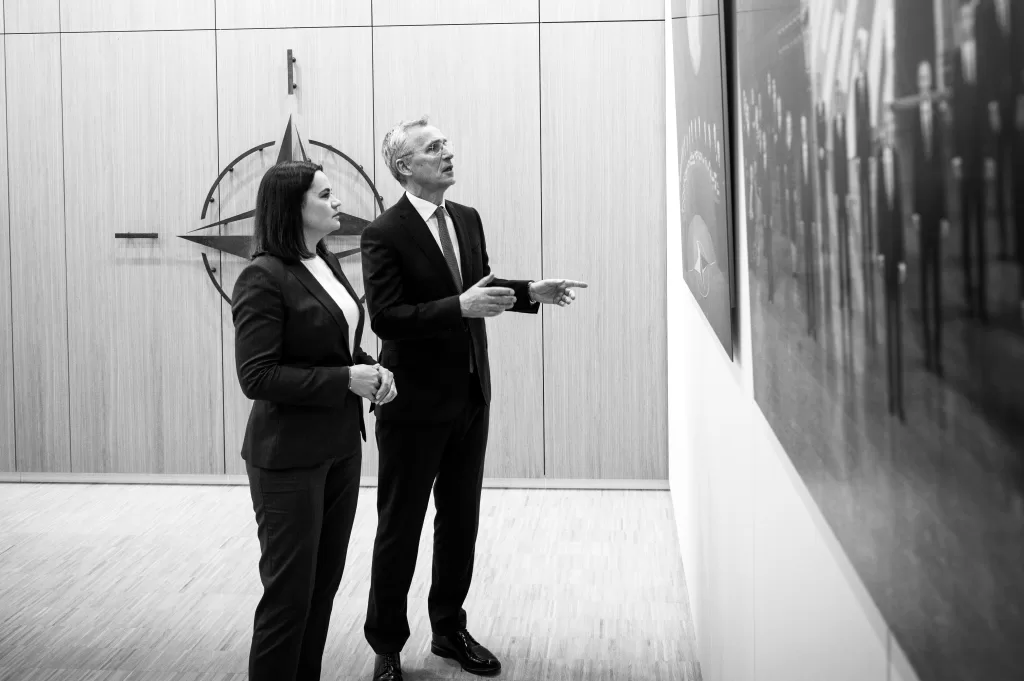Democratic Forces Hope for NATO Cooperation, but Lack Clarity on How It Can Help
 The situation has not changed
The situation has not changed

Following an attempt to gain recognition from European institutions, the United Transitional Cabinet and the office of Sviatlana Tsikhanouskaya intend to deepen cooperation with NATO for a similar purpose. However, they lack a clear vision of how NATO can change the status quo inside and around Belarus.
On May 7th, the leader of the Belarusian democratic forces, Sviatlana Tsikhanouskaya, met with Jens Stoltenberg, the Secretary General of the North Atlantic Treaty Organization.
She conducted a briefing within the North Atlantic Council for permanent representatives of all Alliance member countries to discuss the crisis in Belarus and the prospects for establishing dialogue between the Belarusian democratic movement and NATO on the political agenda.
The talks highlighted the need to establish respectful, constructive relations with NATO, as this is important for national interests and supporting regional security. Such dialogue could help Belarus be perceived as a reliable, peaceful, and predictable partner.
Valery Kovalevsky, representative of the United Transitional Cabinet for Foreign Affairs, noted that initiating dialogue with NATO was the result of the Cabinet’s work to expand cooperation with international organizations.
In turn, NATO Secretary General Stoltenberg highly praised Tsikhanouskaya’s courage and leadership in defending democracy and human rights in Belarus. He expressed concern over new repressions by the Lukashenka regime against the opposition and civil society. The Secretary General of the North Atlantic Alliance reiterated that the people of Belarus have the right to live in freedom and democracy.
Stoltenberg also discussed with the delegation of democratic forces the resistance to the deployment of Russian nuclear weapons on Belarusian territory, as well as Lukashenko’s support for Moscow, which has provided territory and infrastructure for Russia to attack Ukraine. Additionally, NATO called on Belarus to stop participating in the war and to comply with international law. Allies also condemned Moscow’s announced intention to deploy nuclear weapons on Belarusian territory.
Prior to meeting with Stoltenberg, Tsikhanouskaya spoke at Vytautas Magnus University in Kaunas with a lecture on “Regional Stability: The Role of Democratic Belarus in Securing Security in Eastern Europe.” However, she did not address the NATO factor in this issue. The purpose of the lecture was to assess Belarus’s role in the context of regional stability and security in Eastern Europe, particularly in light of the political situation in the country and the possibilities for democratization. Tsikhanouskaya analyzed how Belarus’s internal political and economic factors could affect regional stability and assessed its potential role in shaping democracy in Eastern Europe. Tsikhanouskaya presented three possible scenarios for the situation:
- Ukraine’s victory in the war against Russia, which would give Belarus another historic opportunity. In this scenario, without Russia’s support, the Lukashenko regime would not hold power, so helping Ukraine win the war is a national interest of the Belarusians.
- A compromise or deal with Putin that would freeze the conflict and create a risk of maintaining the status quo in Belarus under Russian control. Then, both dictators would have time to consolidate power and prepare for a new attack. This scenario is dangerous not only for Belarusian independence but also for peace in the region.
- Changes in Belarus before Ukraine’s victory due to the fact that the Lukashenko regime is much less stable than it appears. However, it is unknown what could trigger this: an economic crisis, public discontent, or an elite split.
Thus, despite the intention to deepen relations with NATO, the democratic forces in exile, represented by Tsikhanouskaya, do not see a scenario for direct Alliance involvement in changing the status quo. Meanwhile, within the Alliance itself, there are already discussions about plans to join the war on the side of Ukraine if Belarus directly joins the conflict or if the Lukashenka regime once again provides Belarusian territory for a Russian attack from the north on Ukraine.
Subscribe to our newsletter




Situation in Belarus
Constitutional referendum: main consequences


 Video
Video
How to count the political prisoners: are the new criteria needed?


 Video
Video
Paternalism In Decline, Belarusian Euroscepticism, And The Influence Of Russia


 Video
Video












